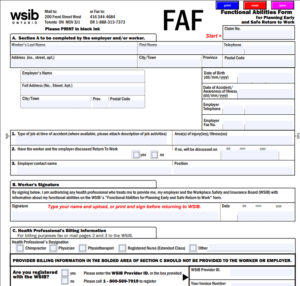Workplace accommodations and functional medical restrictions and limitations are related concepts but differ in their focus and application.
Let’s understand each term:
Workplace Accommodations
Workplace accommodations refer to adjustments or modifications made by an employer to enable an individual with a disability or medical condition to perform their job duties effectively.
These accommodations are intended to remove barriers and provide equal opportunities for individuals with disabilities.
Examples of workplace accommodations include:
- Providing assistive technology or adaptive equipment.
- Modifying work hours or schedules.
- Redesigning workstations or modifying the physical environment.
- Adjusting job tasks or duties.
- Allowing telecommuting or flexible work arrangements.
Workplace accommodations are proactive measures taken by employers to ensure that employees with disabilities can perform their job functions without being disadvantaged due to their condition.
Functional Medical Restrictions and Limitations
Functional medical restrictions and limitations refer to the specific physical or cognitive impairments resulting from a medical condition or disability.
These limitations can affect an individual’s ability to perform certain tasks or activities.
They are typically determined by healthcare professionals, such as physicians, occupational therapists, or vocational rehabilitation specialists, through assessments and evaluations.
Types of Functional Limitations
Functional limitations may include reduced mobility, limitations in lifting or carrying objects, difficulties with fine motor skills, cognitive impairments affecting memory or concentration, and so on.
These restrictions are based on the individual’s medical condition and the impact it has on their functional abilities.
Importance of Functional Restrictions in Identifying Accommodations
Functional restrictions and limitations provide crucial information to employers and help guide the process of identifying appropriate workplace accommodations.
They form the basis for determining the adjustments needed to accommodate the individual’s specific needs.
Summary
Workplace accommodations are the specific measures implemented by employers to facilitate the employment of individuals with disabilities.
Functional medical restrictions and limitations, on the other hand, are the medically determined impairments that affect an individual’s ability to perform certain tasks.
Accommodations are tailored to address these limitations and ensure equal opportunities in the workplace.
FAQs Related to Restrictions, Limitations, and Workplace Accommodations
Are workplace accommodations only applicable to physical disabilities?
Answer: No, workplace accommodations are not limited to physical disabilities.
They can also be provided for individuals with cognitive, sensory, or mental health conditions.
The goal is to address any functional limitations that may affect an individual’s ability to perform their job duties effectively.
Who determines the need for workplace accommodations?
Answer: The determination of workplace accommodations is a collaborative process involving the employer, the individual with a disability or medical condition, and often healthcare professionals.
The input of medical experts, such as physicians or occupational therapists, can be valuable in identifying the specific accommodations needed based on the individual’s functional limitations.
Can an employee request workplace accommodations without having a diagnosed disability?
Answer: Yes, an employee can request workplace accommodations even without a diagnosed disability.
If an individual has a medical condition that substantially limits their ability to perform essential job functions, they may be eligible for workplace accommodations under the Accessible Canada Act or similar legislation in their country.
Do workplace accommodations always require high financial costs for employers?
Answer: Not necessarily. Many workplace accommodations can be implemented at little to no cost to the employer.
Simple adjustments, such as modifying work schedules or providing ergonomic equipment, can often make a significant difference in accommodating an employee’s limitations.
In some cases, government programs or grants may also help cover the costs of accommodations.
Are workplace accommodations permanent or can they be adjusted over time?
Answer: Workplace accommodations are not necessarily permanent and can be subject to change.
As an employee’s medical condition or functional limitations evolve, accommodations may need to be reevaluated and adjusted accordingly.
Employers should maintain open lines of communication with employees to ensure that accommodations remain effective and responsive to their needs.






